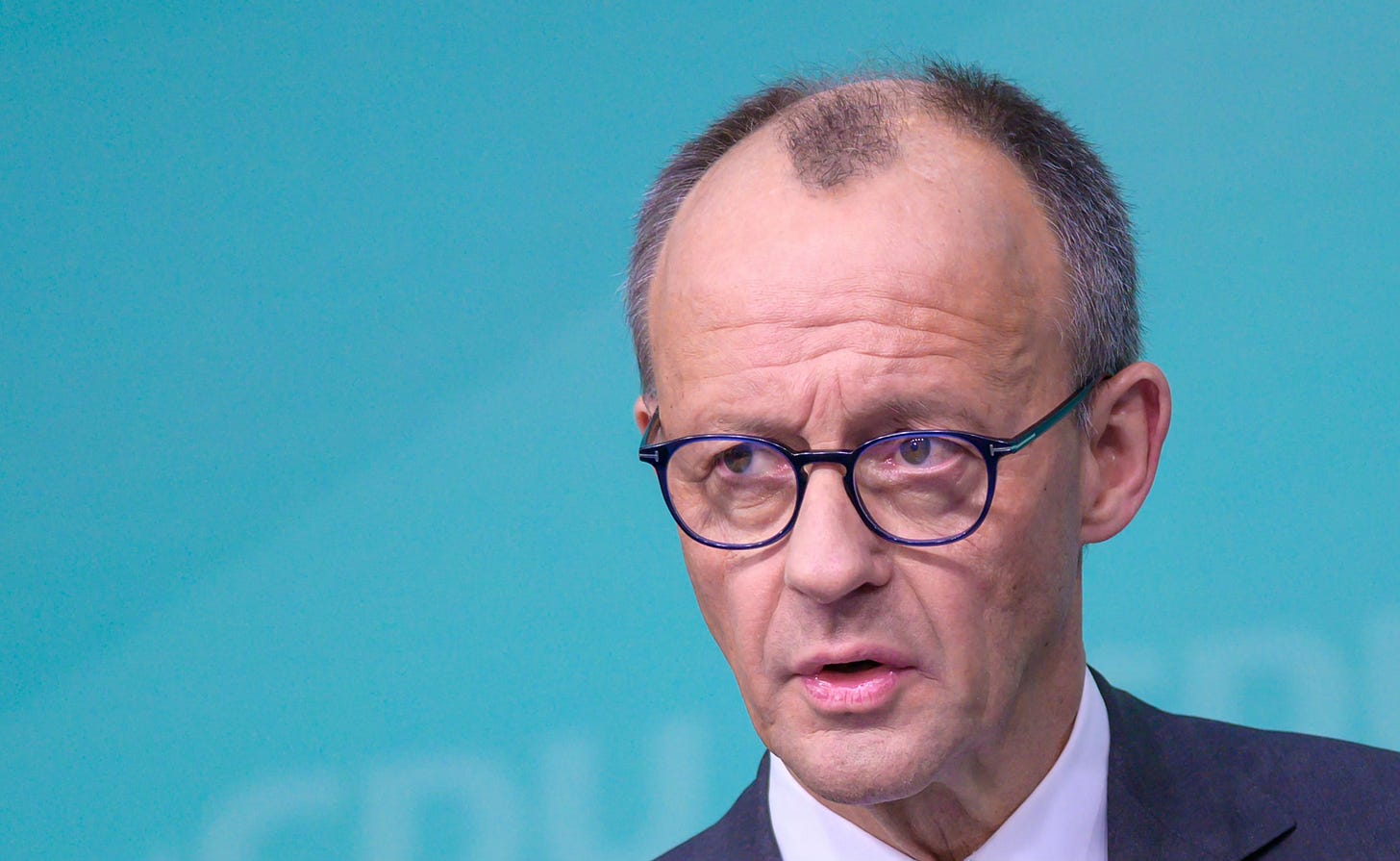Germany's Extremism Problem Requires an Economic Cure
The centrist Christian Democrats' slim election victory won't hold the illiberal right or left at bay if the party doesn't restore growth and dynamism

The outcome of Germany’s election last Sunday will not allay growing concern about the surge of illiberal populism in democracies around the world. True, the center-right Christian Democrats—who have governed post-World War II Germany for most of the last seven decades—“won” by finishing first. But that may come to be seen by supporters of liberal democracy in Germany and outside it as a rather hollow victory. In securing only 28.5% of the vote and 208 of the Bundestag’s 630 seats (about a third), the Christian Democrats have handed a difficult and complex negotiation challenge to their party leader Friedrich Merz who, at age 69, will become chancellor (and a member of the governing cabinet) for the first time.
The big gainer on Sunday was Alternative for Germany (AfD), a far-right, anti-immigrant party which has gained support even as it has radicalized in recent years, and whose youth wing has been classified by Germany’s domestic intelligence agency as an extremist organization. In May of 2024, a German court ruled that the AfD had “positions that disparage the democratic order and are incompatible with the principle of democracy.” The leader of its far-right faction, Björn Höcke, who led the party to its first-ever, first-place finish in a state election last year in Thuringia, “has been fined for using a Nazi slogan and accused of ‘whitewashing’ Nazi crimes in Germany’s past,” as a PBS Frontline report put it. There, and in two other states in the former East Germany, the country’s domestic intelligence has classified the party organization as right-wing extremist. While it might be too much to call the AfD a neo-Nazi party, it has neo-Nazis in it, and plenty of troubling sympathy with that past.
The AfD doubled its vote strength on Sunday to become Germany’s second largest party, winning nearly a quarter of the seats in parliament with 20.8% of the vote. In fact, it more than doubled its vote total to over 10 million, in an election that saw the highest voter turnout (83%) of any German election since reunification in 1990. The AfD’s share of seats in parliament is now nearly double its historic high (of 13.2%, garnered in the 2017 election). While some AfD partisans had hoped to finish “neck and neck” with the Christian Democrats, the party leader, Alice Weidel, nevertheless was exuberant with the outcome. She exclaimed on election night, “They wanted to halve us, but the opposite has happened!”
The Rise of the Extremist Left
The dilemma for liberal democracy in Germany does not end with the weak winning performance of the Christian Democrats and the historic gain of the AfD. The far-left Die Linke (Left) Party—which includes (from an earlier merger of two parties) a direct descendant of the former Communist Party of East Germany—had one of its better performances in recent elections, winning nearly 9% of the vote and 64 seats of the 630 seats in the German Bundestag. The far left would have won more seats but for a feature of Germany’s electoral system: To enter parliament under Germany’s system of proportional representation, a party must generally win at least 5% of the vote. A former member of Die Linke (and before that, of the successor party to the East German communists), Sahra Wagenknecht, broke away in late 2023 to found her own party (the BSW, named after herself). It promotes an eclectic brew of left-wing economics and right-wing nationalist resentment over immigration and social changes, such as gender-affirming care. Her party won 4.97% of the votes; with just 28,000 more votes, it would have won over 30 parliamentary seats.
The three parties whose commitment to liberal democracy in Germany is in doubt—the AfD from the far right, and the Left Party and BSW from the far left—together won over a third of the vote. That means they can block any change to reform or strengthen the German constitution. And it means that if the established parties keep failing to address the two dominant concerns of German voters in this election—a stagnant economy in need of investment and deregulation, and immigration—political momentum will continue to shift to outsider parties, or what many observers consider “anti-system” (as in anti-democratic) parties. A German pro-democracy activist and civic educator commented shortly before the election, “The established parties have no answers.” What they “mostly do is just keep the system running. But the system itself doesn’t work that good anymore.”
Christian Democrats: The Wobbly Victors
With not quite a third of the seats in parliament, and with a natural partner, the liberal-democratic, pro-business Free Democrats also falling short of the 5% threshold, Merz will have to turn to the outgoing Social Democrats to form a governing coalition. Between them, that would give him a narrow majority of the seats (52%). He could also forge a three-way coalition with the other current party in the coalition, the moderate left Green Party. But the danger there is that if almost all the pro-system parties are in the governing coalition and all the anti-system parties are outside it, what happens if Merz’s government fails? Then the alternative becomes, literally, the Alternative for Germany. Or, more precisely, Germany may someday face the possibility that a government cannot be formed without breaking the “firewall” and bringing into the coalition a party of the far right or far left.
The 2025 election is the first in Germany’s post-World War II history to see the two main parties, the Christian Democrats and Social Democrats, together fall well below half the vote (with just 45%). Their dominance has been in steep decline since the half-century spanning 1953 through 2002, when they together regularly won between three-quarters and 90% of the vote (with the centrist Free Democrats picking up most of the rest). The combined vote share of these two parties of the center-right and center-left fell to 69% in 2004, 57% in 2009, 53% in 2027, and just a hair under 50% in 2021. With the Greens retaining an 8 to 12% vote share on the left and the political spectrum fragmenting unpredictably, it isn’t clear that the two formerly dominant parties will ever again be the anchors of German democratic stability that they were for most of the post-War era.
Germany’s Imperiled Center
With its 5% threshold, the German electoral system avoids the danger of extreme party fragmentation that plagued the Weimar Republic of the interwar era, but as Sunday’s election showed, that minimum threshold can punish a small centrist party as much as a far left one. By 1930, the Nazis and the Communists together were winning nearly a third of the vote. Once that threshold is crossed, it becomes harder for the center to hold—by keeping the extreme parties out. Together, the Nazis and the Communists won about 52% of the vote in July 1932 and about 50% in November of that year. In the latter election, the Nazi vote share declined four points, to 33%, but that was still large enough for the exhausted traditional right to make the catastrophic mistake of inviting Hitler to form a government.
Democracy in Germany today is far more stable, deeply rooted, and well-structured than the Weimar Republic was. The AfD is not the Nazis of old, and neither is Die Linke a reincarnation of the Communist Party of Germany. But the echoes are disturbing enough to take the 2025 elections as a warning sign. It is vital for the future of liberal democracy in Germany, in Europe, and indeed the world, that Friedrich Merz’s new government succeed in reviving German economic dynamism and self-confidence.
One last thing…
Earlier this month, U.S. Vice President JD Vance took the stage at the Munich Security Conference, delivering a speech warning that free expression is under threat across Europe, pointing to censorship in Scotland, Romania, Sweden, and Germany. But he’s one to talk given that his own administration is arguably a bigger enemy of free speech. Trump and his allies have attacked journalists, weaponized lawsuits against private companies, and created a chilling climate for dissent. Landry Ayres, The UnPopulist’s senior producer, unpacks the hypocrisy behind Vance’s claims in this short video. Watch it here.
An earlier version of this piece was first published by Larry Diamond on Substack.
Follow us on Bluesky, Threads, YouTube, TikTok, Facebook, Instagram, and X.
We welcome your reactions and replies. Please adhere to our comments policy.








This is a bit off. Just because they have the name "democrats" in the party, doesn't make them centrists. Merz has collaborated with the far-right AfD in trying to pass anti-immigrant legislation and has suggested ignoring European and domestic law to reject asylum seekers coming to Germany. Further, he wants to make citizenship more difficult and get rid of Germany's climate promises - very much like the far right, "anti-democracy" AfD. In addition, he's promised to ignore the ICC warrants against Netanyahu and host him in Berlin. Its not so simple as "pro" and "anti-" democracy. Someone who wants to copy far-right positions and ignore international law should not be positioned as the "center" and he is certainly not viewed that way here, despite belonging to the party of Merkel.
The two radical thrusts of political influence burst forth most noticeably around the end of WWII, with the advent of the internet facilitating the conveying of ideas, some Progressive, the rest Stand Pat or Regressive. (Why anyone would want to regress seems the odd person out, though when progressivism --is that a real word?-- gets overly strident, it can be almost as bad.)
The best any facilitator of ideas can do is offer a level playing field, and let the chips fall where they may, with vulgarisms censored out for the sake of common courtesy.
Simplicity of facilitation helps. Complexity hurts. Let the chips fall where they may.